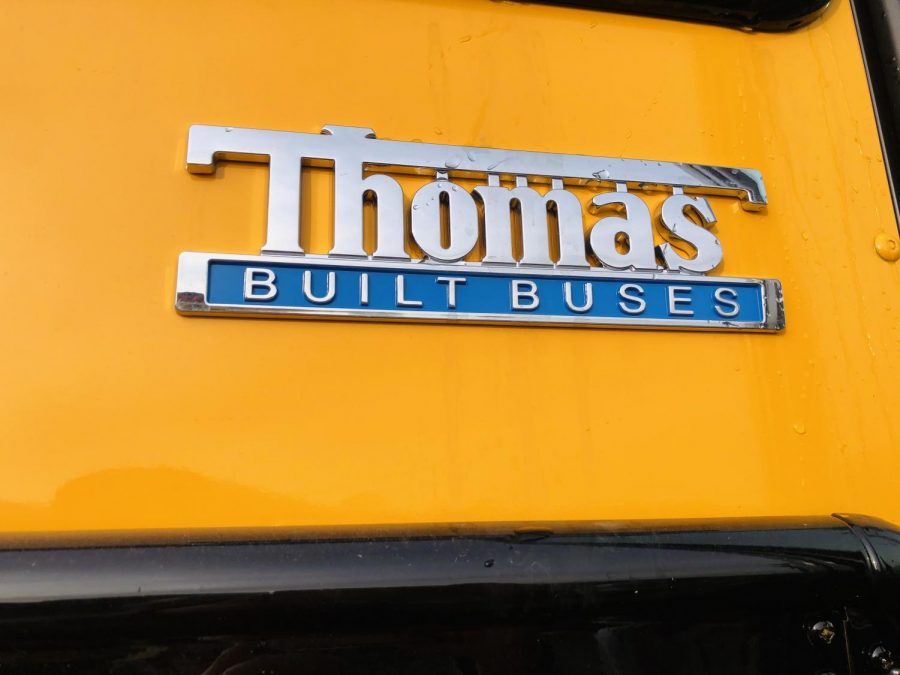Delphi paving the way with electric bus purchase
On Dec. 8, 2020, Delphi received an electric bus after applying for it through Indiana Department of Environmental Management (IDEM). The idea for an electric bus came from former superintendent, Mr. Briles, but Director of Operations Mr. Ross Striebeck is also excited about the new bus. Delphi has the distinction of having one of only thirty electric school buses in the country, and one of two in the state of Indiana, with Bloomington having the other.
Given that Delphi is a small town and doesn’t have much of a carbon footprint to begin with, having an electric bus still greatly reduces our carbon footprint. In that sense, an electric bus is more effective than our standard diesel buses. “This fits what we are doing with the solar fields and everything. It’s a good fit,” stated Mr. Striebeck. The electric bus makes sense environmentally, however, it does not make as much sense economically. For the full cost of an electric bus, which is slightly over $405,000, we could purchase three diesel buses. However, due to the money received from IDEM, the amount of money we paid for it was much lower, $95,000. Without the grant money, DCSC would never have been able to get the electric bus to begin with. The hope is that as technology improves, the cost will go down, making electric buses more accessible.
Given the level of efficiency, and taking cost into consideration, it is unlikely that the electric buses will be used for country routes. Those routes simply cover too many miles and would involve extra charging. But, for the city routes, the bus works perfectly well. If the bus is to stick to city routes, it would only need to be charged once a week, however, if it were to be used on a county route, it would need to be charged every other night. That would not be cheap. To give you an idea of how much that would cost, at Walmart it is thirty-five cents a minute to charge an electric car. To get a full charge, it takes approximately eight to ten hours, sometimes less. It really just depends on how low you let it run down. It’s almost like a phone in that way. There are many speculations over how different methods of charging affect the battery and how long it will be able to hold a charge.
However, since electric buses are so new, there are a lot of unknowns. One of the biggest unknowns is wondering what will become of the battery in 12-15 years when the bus is retired. Fortunately, Duke Energy is already trying to figure out new uses for the batteries which will help reduce the hazardous waste. Interestingly, another unknown is how to assess the situation should the bus ever get in an accident. Delphi is currently training local firefighters, police officers, and sheriffs on proper protocols. Part of that is showing them all the shut offs for the bus and informing them of the high voltage areas. As with any new technology, there is much to learn, so DCSC will need to be patient during that learning period. Everything our school system learns about the bus is helping the company improve the product, and Thomas Built Buses is appreciative of our school for taking advantage of this opportunity.
Despite the few drawbacks and all of the unknowns, electric buses pose multiple advantages. As mentioned, it can and will reduce our carbon footprint. On top of that, the electric bus is much quieter than the diesel ones. It’s so quiet you don’t really hear it coming. It would be so nice to see more of them in bigger cities such as New York, Los Angeles, and Chicago. Since the bus is run by electricity, there is no need for oil or diesel; therefore, the school would be saving thousands of dollars over time by not having to pay for fluids. However, we are paying for electricity. Indirectly, we are using the power generated from the solar fields to power the bus. With the solar fields, we are selling the electricity to Duke and then getting it back to power the bus. “It’s still kind of weird to say I have three quarters of a tank of electricity,” comments Mr. Striebeck. Like a regular bus, this one has a fuel gauge, it just tells you how much power you have left instead of diesel. Also similar to diesel and gas vehicles, if you leave the electric bus idling, it will drain the energy.
The goal in the future is to have two or three electric buses for the town routes. If the school board approves, Delphi may even apply to get a second bus in the coming months. Delphi could very well be playing a part in changing the ways of transportation for the whole country.
Curious citizens may wonder: If Delphi is a small town with a low carbon footprint compared to many other areas, then why bother with an electric bus to begin with? To answer that, the goal for Delphi is to lower our carbon footprint even more. Everyone involved with electric buses still has a lot to learn, but they could really help our country lower its carbon footprint if more people were to invest in electric buses. As for right now, Delphi is part of the learning curve, helping others as well as ourselves learn more about how electric buses could change our future.

Emily is a senior at Delphi and is in her third year of Parnassus. She is involved in golf, tennis, Student Council, National Honor Society, Creative Writing...














